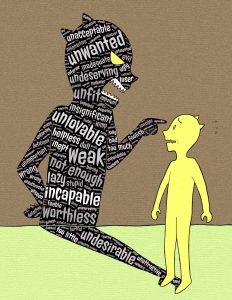A Pandemic of Inner Critics
by Agnieszka Olszewska–Kaczmarek
The Covid-19 virus is still raging all over the world. We are waiting for the moment when we can all breathe a sigh of relief and feel safe. However, there is another virus that most of us will struggle with all our lives.
“I can’t. I’m not that skillful. I’m too fat. I screwed up again. I’m too old. don’t have enough energy,” etc.
This is the inner critic virus (IC) that clips our wings, usurps our energy and deteriorates our quality of life.
The IC may impact our ability to pursue our full potential, or even prevent us meeting everyday obligations.
The IC is spread around the world, flooding it with waves of negativity and harmful behaviors or hate crimes. Internet forums are filled with poisonous comments, politicians compete with nasty epithets, many TV programs build their popularity on the public humiliation of participants in various competitions, and bullying is a huge problem in schools. And, as with Covid-19, for some the encounter with the IC ends tragically.
In the struggle with the IC, supplementation with positive affirmations is often
not enough. Even though we praise ourselves and repeat it like a self-love mantra, the IC often spreads throughout the body and attacks other organs. It challenges us to a
mythic battle where our health or survival allows us to be free from the infection that
awaits us down the road. Along with the defeated disease, we immunize ourselves to life’s
challenges and learn to persist along our life path.
Process Work (whose methods I use in my daily therapeutic work with clients) approaches
the topic of self-criticism through many dimensions. So, let’s look at the IC different angles.
How to fight the IC?
The first step is to notice there is an infection within us.
When I hear my clients talk about themselves negatively, I say out loud, “Oh! I hear there’s a critic here with us!”
Most often there is an initial moment of surprise. The IC part responsible for the harmful narrative is separate from our awareness. The IC is brought to light and we can finally look at it consciously.
Who is the IC?
What does this person say? With what voice and with what energy? Does the voice have a gender? Is it one person or many? Is this the voice of someone in our family? Or maybe it’s the voice of the spirit of the times, culture or religion?
Nobody knows their critic as well as the person who comes to therapy. Therefore, during the therapeutic session, they have the opportunity to play the IC role and present all its voices and views.
Most of the content conveyed by the IC is general. However, several specific types of IC can be picked out;
The Critical Coach
Contrary to initial appearances, sometimes the IC has something valuable to tell us. It is best then to force this figure to be as precise as possible. Starting with an objective or
blatant example of how you are lazy, or whatever the general criticism is.
After applying a series of questions, it may turn out that the IC sees our potential and demands we live up to it. They may even have very precise advice for us and in this way become a priceless coach.
The Empathetic Critic
Sometimes there’s an IC who loves us and cares about our lives, but is like an awkward parent who is unable to compliment or constructively suggest a course of action. This type of inner critic may be completely unaware of their devastating influence. Then we have to educate this part of ourselves to communicate in a way that gives us wings. Revealing our deep feelings can work miracles. When such an IC sees how hurtful their words are then they sometimes experience a shock. Empathy can be activated and potentially a client may see an increase in awareness of how words can have a healing or damaging influence.
The Brutal Critic
The last category is an IC who only seeks to demean and destroy the person. It is most often a result of abuse. In such a case, it is necessary to set a very clear line, or even to symbolically kill the IC. One of my clients decided that whenever she hears a hateful voice in her head, she would punch the air, imagining throwing the critic out of her mind.
After repeating such a gesture for several weeks, this critical voice stopped. This type of struggle can be a particular challenge for people who associate the use of force with violence. You must first disassociate such a connection to be able to give yourself the right to self-defense.
Taking over the critic’s energy
Regardless of what kind of IC we are dealing with, it is beneficial for us to
seize its energy. After all, it is our own strength that can work for our good. Acting out a
criticism, shy people suddenly turn into passionate preachers, quiet mice into resolute
leaders or managers, and the undecided are able to hit on concrete details like in a
boxing ring. The broken record of negativity shows us what layers of persistence lie dormant in us. In this way, we begin to have access to a new quality of inner awareness and strength.
IC Pandemic Reduction
Self-criticism forces us to track it in our thoughts and persistently examine our emotions. If the inner monologue is dragging us down, it is worth tracing the source of the IC. In such a way, by consciously examining our internal and external communications, we contribute to reducing the global epidemic of criticism.
By Agnieszka–Kaczmarek, MA, MAPOF
Agnieszka Olszewska–Kaczmarek is a psychologist and psychotherapist. She completed
her master’s in Processwork at the Process Work Institute in 2020. She lives in Poland
and works in a psychiatric hospital for children and teenagers, as well as at the Center For Womens Rights, and in private practice.
Agnieszka is also a singer-songwriter, performing under her stage name, Back To The Ocean.
Find more about Agnieszka’s work and music :
https://agnieszkatherapy.webnode.com
https://www.facebook.com/AgnieszkaOK.ProcessWork
https://www.reverbnation.com/backtotheocean
Image credit: John Hain


